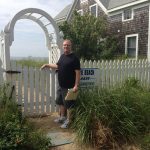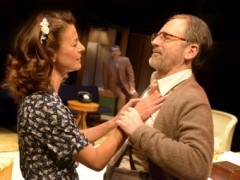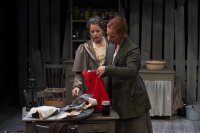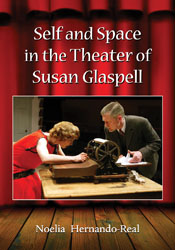Friday, May 25, 2013, at the ALA Conference, Boston.
In attendance: Cheryl Black, Martha Carpentier, Sharon Friedman, Noelia Hernando-Real, Basia Ozieblo, Michael Winetsky.
1) Martha Carpentier, on behalf of the International Susan Glaspell Society, thanked Sharon Friedman for organizing the “Theatre of Engagement” panel and Cheryl Black for organizing the concert reading of “Performing Bohemia.” She awarded Noelia Hernando-Real with a travel grant unanimously approved by the Executive Council.
2) Winner of Best Published Paper prize:
Noelia Hernando Real, “Sane Enough to Kill: On Women, Madness, and the Theatricality of Violence in Susan Glaspell’s The Verge.” Violence in American Drama: Essays on Its Staging, Meanings and Effects. Eds. Alfonso Ceballos Muñoz, Ramón Espejo Romero and Bernardo Muñoz Martinez. Jefferson, NC: McFarland, 2011.
3) President’s Report:
Martha summarized ISGS conference activities and publications since the last business meeting in 2011. The impressive list includes Drew Eisenhauer and Brenda Murphy’s Intertextuality in American Drama: Critical Essays on Eugene O’Neill, Susan Glaspell, Thornton Wilder, Arthur Miller and Other Playwrights (McFarland, 2013 which includes seven articles on Glaspell) and Noelia Hernando-Real’s Self and Space in the Theater of Susan Glaspell (MacFarland, 2011), dissertations (by Emeline Jouve, Ling Jian-e, and Michael Winetsky), performances, readings, and papers at the International Conference on Theatre and Drama (Seville 2012) and the Justice Served Symposia (MU, 2012). Cheryl Black announces that Milbre Burch won a prize for her piece “Sometimes I Sing” and that she got another prize for producing the Justice Served Symposia. Martha reminded us all that the website is a blog, so that we can all share our accomplishments. We continue to accomplish the goals stated in the Society mission statement, increasing the visibility of Glaspell and her work in both academic and theatre communities. There is one issue that, however, worries us all and it is the diminishing number of members. There are 45 members now, after a high of 70 in 2010, and Martha reminded us all to keep recruiting in mind, particularly among graduate students. Martha announced that together with Noelia she will check if we are eligible and how to apply to MLA as a subgroup, since this would increase visibility, and hence numbers.
Martha informed the group about Chad Coffman, a college student and Davenport native who discovered a four page-story by “Susie Glaspell” hand-written in Feb 1893 titled “The Holy Grail: The Story of Sir Percival’s Sister” in the Davenport Public Schools archives. Martha showed copies of the original and her transcription. Martha added that Coffman believes he has discovered Glaspell’s birth house at 502 Cedar Street, which had been thought lost.
Martha informed us that our nomination of Glaspell didn’t make the cut for the National Women’s Hall of Fame, a lengthy application that was spearheaded by Ellen and prepared by Ellen, Noelia, Cheryl, Basia, and Martha. They automatically roll unsuccessful nominations over to the next cycle for re-consideration (every two years, hence 2015). Martha suggested that we use excerpts from this piece to update Wikipedia, which has gaps that could use filling in by the ISGS. Noelia noted that since it will be re-considered again, we should wait to use this material rather than publishing it online. Michael Winetsky affirmed he has been working on the Wikipedia and he will continue to do so.
4) Vice-President’s Report:
Noelia focused on the status of the Literary Encyclopedia entries, pointing to all the entries that need to be written.
Entries published between 2011 and the present meeting include Emeline Jouve’s Springs Eternal and Chains of Dew, Milbre Burch’s Chronology, and Michael Winetsky’s The Glory of the Conquered. Linda Ben-Zvi is working on Free Laughter, Sherry Engle on The Comic Artist, Drew on Lifted Masks and Michael Winetsky on Judd Rankin’s Daughter.
Cheryl is going to ask a student of hers to write the entry on Bernice, and Martha will write the entries on Norma Ashe and Ambrose Holt and Family, and she will ask a student of hers to do The Morning is Near Us and Mary Papke to write on The Visioning. Martha will also ask Patricia Bryan about writing the entry on Her America.
Additional Notices:
5) Martha announced the world premier of Springs Eternal scheduled for this September/October at the Orange Tree Theatre in London. Director Sam Waters finds the play very moving, and he’s very excited about finally bringing this work to the stage. He’ll also do a reading of Bernice at some point during the run. Thanks to J. Ellen Gainor for this great news. Noelia suggested asking Sam whether he would be interested in letting us organize a seminar as we did last time. Everybody finds this a good idea and Basia will ask Sam personally next June.
6) Martha mentioned briefly the progress of Emeline Jouve’s and her plans for Susan Glaspell’s Trifles and “A Jury of Her Peers”: A Centennial Celebration. Martha informed us of contributors who have already been accepted and noted that the CFP is still open until the end of June.
7) Plans for the P’town Players and Trifles Centennial Conference:
The group decided to work with the Eugene O’Neill Society and set the Trifles centennial in 2016, when Trifles was first produced and Eugene O’Neill became a member. Also we agreed to assist Jeff Kennedy, EONS incoming President, in planning an event in P’town in the summer of 1915 to celebrate the beginning of the PPs themselves.
We agreed to form an “Ad Hoc Centennial Conference Planning Committee” to aid the ISGS Executive Council in planning the conference: to include Cheryl Black, Linda Ben-Zvi, J. Ellen Gainor, and Michael Winetsky.
It is set that the ideal place for our centennial is NYC, as it worked out so beautifully last time. We will count on Sharon Friedman’s help with space in the Gallatin School, and Jeff Kennedy has affirmed that he will be able to get the Playhouse again. The date will be towards the end of June. Martha and Noelia presented some topics for panels and asked the members to keep thinking about topics and to volunteer to chair panels. Some of the topics discussed were:
– Panel on biography (to be chaired by Basia)
– Panel on Jury’s publication history (to be chaired by Martha)
– Panel on Trifles/Jury and law (possibly to be chaired by Patricia Bryan)
– Panel on adaptations (film, theater, etc; to be chaired by Sharon)
– Panel on Intertextualities: Susan Glaspell/Eugene O’Neill (to be co-chaired by Noelia and a member of the Eugene O’Neill Society)
– Panel on Heterodoxy (possibly to be chaired by Blanche Wiesen Cook)
– Roundtable on Trifles in performance (possibly to be chaired by Sherry Engle)
Cheryl agreed to work on a script. It was also suggested that we could entice a local NYC theater group (some suggestions were the Mint or Metropolitian theaters) to do Trifles and Bound East for Cardiff, and that Milbre Burch could do her piece “Sometimes I Sing”. Jeff Kennedy also may assemble “notables,” such as the Gelbs and Tony Kushner, for a reading of these two pieces.
We still have to think about keynote speakers and contact them. Martha reminded us that J. Ellen Gainor may try to get Elaine Showalter, and Sharon offered to contact Carol Gilligan. Financial support for such an eminent speaker must be addressed.
 July 9-12, 2015 in Provincetown, MA, a centennial conference sponsored jointly by the Eugene O’Neill Society and the International Susan Glaspell Society returned to the scene where Glaspell’s and O’Neill’s first plays were read on the wharf in Provincetown on July 15, 1915. This four-day celebration included walking tours, performances at the Provincetown Theatre, roundtables, a gala reception, fish-house punch, and more! Roundtables included: “Intertextualities in Works by Women Playwrights of the Provincetown Players,” chaired by Martha C. Carpentier; “Jig, Susan, and Gene: The Triumvirate that Shaped the Provincetown Players,” chaired by Linda Ben-Zvi, plus a wonderful guided walking tour hosted by O’Neill Society President, Jeffrey Kennedy.
July 9-12, 2015 in Provincetown, MA, a centennial conference sponsored jointly by the Eugene O’Neill Society and the International Susan Glaspell Society returned to the scene where Glaspell’s and O’Neill’s first plays were read on the wharf in Provincetown on July 15, 1915. This four-day celebration included walking tours, performances at the Provincetown Theatre, roundtables, a gala reception, fish-house punch, and more! Roundtables included: “Intertextualities in Works by Women Playwrights of the Provincetown Players,” chaired by Martha C. Carpentier; “Jig, Susan, and Gene: The Triumvirate that Shaped the Provincetown Players,” chaired by Linda Ben-Zvi, plus a wonderful guided walking tour hosted by O’Neill Society President, Jeffrey Kennedy.








